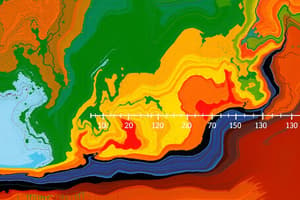Podcast
Questions and Answers
What inspired Wen-lu to pursue chemistry?
What inspired Wen-lu to pursue chemistry?
- Mentoring graduate students
- Wanting to teach others
- The ability to make things change (correct)
- Understanding what's going on in everyday life
Why does Wen-lu enjoy having students work with her in her lab?
Why does Wen-lu enjoy having students work with her in her lab?
- They help her with her research
- She likes to mentor people who will work with her in the future
- She gets to teach them about chemistry
- They ask her thought-provoking questions (correct)
What is the average thickness of ocean crust?
What is the average thickness of ocean crust?
- 50 km
- 5 km (correct)
- 120 m
- 4 km
What is the distance from the edge of the outer core to the center of the Earth?
What is the distance from the edge of the outer core to the center of the Earth?
How old is the Earth, approximately?
How old is the Earth, approximately?
What process did scientists use to determine the age of the Earth?
What process did scientists use to determine the age of the Earth?
What type of education did Wen-lu Zhu receive prior to starting her work at the Woods Hole Oceanographic Institution?
What type of education did Wen-lu Zhu receive prior to starting her work at the Woods Hole Oceanographic Institution?
Why does seawater seep down through cracks in the seafloor along hydrothermal vents?
Why does seawater seep down through cracks in the seafloor along hydrothermal vents?
What affects the chemistry of the hydrothermal fluid in the vents along the volcanically active mid-ocean ridge?
What affects the chemistry of the hydrothermal fluid in the vents along the volcanically active mid-ocean ridge?
What is the primary focus of Wen-lu's research at the Woods Hole Oceanographic Institution?
What is the primary focus of Wen-lu's research at the Woods Hole Oceanographic Institution?
What role does the magma play in the process of hydrothermal fluid formation?
What role does the magma play in the process of hydrothermal fluid formation?
Which area of study is associated with rocks found around hydrothermal vents?
Which area of study is associated with rocks found around hydrothermal vents?
Flashcards are hidden until you start studying
Study Notes
Wen-lu Zhu's Background and Inspiration
- Developed an interest in chemistry at the age of 10 due to the ability to change things and figure out how they work
- Enjoys figuring things out and exploring the unknown
- Inspired by the curiosity and questions of students she works with
Wen-lu Zhu's Work and Research
- Associate Scientist in the Department of Geology and Geophysics at Woods Hole Oceanographic Institution
- Received PhD in Geophysics from SUNY at Stonybrook in 1996
- Research focus: hydrothermal vents and the chemical reactions between seawater and rocks in the ocean crust
Hydrothermal Vents
- Form along the volcanically active mid-ocean ridge on the deep ocean floor
- Seawater seeps down through cracks in the seafloor, is heated by magma, and then rises back up and spews out of vents
- Chemical reactions occur between the heated seawater and rocks in the ocean crust, altering the chemistry of the hydrothermal fluid and the ocean
Earth's Structure and Age
- Average depth of the oceans: 4 km
- Deepest hole ever drilled in the crust: 12 km
- Distance from the edge of the outer core to the center of the Earth: 3200 km
- Radius of the planet: 6400 km
- Age of the Earth: approximately 4.6 billion years
- Determined using radioactive isotopic decay (radiometric dating) and zircon minerals in Earth's oldest rocks
Studying That Suits You
Use AI to generate personalized quizzes and flashcards to suit your learning preferences.



